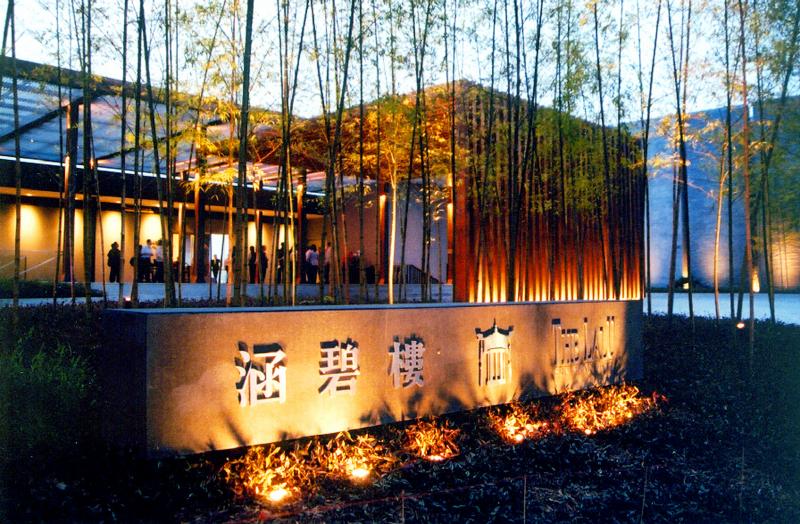Luxury hotel The Lalu (涵碧樓) last year outperformed its peers in revenue per available room (RevPAR), as resort facilities benefited from a boom in domestic tourism, while urban hotels were hit hard by fallout from the COVID-19 pandemic, a survey by Colliers International Taiwan (高力國際) showed yesterday.
The Lalu, near Nantou County’s Sun Moon Lake (日月潭), achieved a RevPAR of NT$9,727 (US$342.42) in the first three quarters of last year, followed by the nearby Fleur de Chine Hotel (雲品溫泉酒店) with NT$5,938 and the Silks Place Taroko (太魯閣晶英酒店) in Hualien County with NT$5,915, the quarterly survey found.
Strict border controls have fueled a boom in domestic tourism and the windfall is most evident in the eastern counties of Yilan, Hualien and Taitung, Colliers Taiwan said, adding that the trend is likely to continue until cross-border travel is once again safe.

Photo: CNA
RevPAR is a metric used in the hospitality industry to measure hotel performance by multiplying a hotel’s average daily room rate by its occupancy rate.
The Lalu saw an average daily room rate of NT$14,474 during the period, enabling it to retain the top spot for a second consecutive year, despite an occupancy rate of only 67.2 percent, lower than popular resorts in Pingtung County’s Kenting (墾丁) area and elsewhere.
Caesar Park Kenting (墾丁凱薩) topped the survey with an average occupancy rate of 86.87 percent, followed by the Hotel Royal Chihpen (知本老爺酒店) in Taitung County at 80.3 percent, and Alishan House (阿里山賓館) in the Alishan National Forest Recreation Area (阿里山國家森林遊樂區) at 71.03 percent, it said.
The three facilities had average daily room rates of NT$5,332 to NT$4,425, it said.
Government-issued travel subsidies and the Triple Stimulus Vouchers helped fan domestic tourism, but the effect was limited for hotels in urban locations, due to their dependence on foreign tourists, Colliers Taiwan said.
Foreign tourist arrivals plunged 87.3 percent to 1.36 million in the first 11 months of last year, causing the average hotel occupancy rate in Taipei to fall to 26.22 percent, from 73.25 percent a year earlier, the real-estate consultancy said.
The pandemic offers unprofitable hotels a sobering opportunity to exit the market, even though the public health crisis would eventually end, Colliers Taiwan said.
Many buyers at home and abroad remain eager to enter the hospitality industry, especially in the six special municipalities, which are convenient locations, the broker said, adding that loss-making facilities without a diverse clientele should close.
Hotel transactions in the Asia-Pacific region shrank nearly 50 percent to US$8.1 billion last year, it said, adding that Taiwan made the top five list thanks to the purchase of Sunworld Dynasty Hotel Taipei (王朝大酒店) in July by Fubon Life Insurance Co (富邦人壽) for NT$26.8 billion.

Intel Corp chief executive officer Lip-Bu Tan (陳立武) is expected to meet with Taiwanese suppliers next month in conjunction with the opening of the Computex Taipei trade show, supply chain sources said on Monday. The visit, the first for Tan to Taiwan since assuming his new post last month, would be aimed at enhancing Intel’s ties with suppliers in Taiwan as he attempts to help turn around the struggling US chipmaker, the sources said. Tan is to hold a banquet to celebrate Intel’s 40-year presence in Taiwan before Computex opens on May 20 and invite dozens of Taiwanese suppliers to exchange views

Application-specific integrated circuit designer Faraday Technology Corp (智原) yesterday said that although revenue this quarter would decline 30 percent from last quarter, it retained its full-year forecast of revenue growth of 100 percent. The company attributed the quarterly drop to a slowdown in customers’ production of chips using Faraday’s advanced packaging technology. The company is still confident about its revenue growth this year, given its strong “design-win” — or the projects it won to help customers design their chips, Faraday president Steve Wang (王國雍) told an online earnings conference. “The design-win this year is better than we expected. We believe we will win

Chizuko Kimura has become the first female sushi chef in the world to win a Michelin star, fulfilling a promise she made to her dying husband to continue his legacy. The 54-year-old Japanese chef regained the Michelin star her late husband, Shunei Kimura, won three years ago for their Sushi Shunei restaurant in Paris. For Shunei Kimura, the star was a dream come true. However, the joy was short-lived. He died from cancer just three months later in June 2022. He was 65. The following year, the restaurant in the heart of Montmartre lost its star rating. Chizuko Kimura insisted that the new star is still down

While China’s leaders use their economic and political might to fight US President Donald Trump’s trade war “to the end,” its army of social media soldiers are embarking on a more humorous campaign online. Trump’s tariff blitz has seen Washington and Beijing impose eye-watering duties on imports from the other, fanning a standoff between the economic superpowers that has sparked global recession fears and sent markets into a tailspin. Trump says his policy is a response to years of being “ripped off” by other countries and aims to bring manufacturing to the US, forcing companies to employ US workers. However, China’s online warriors